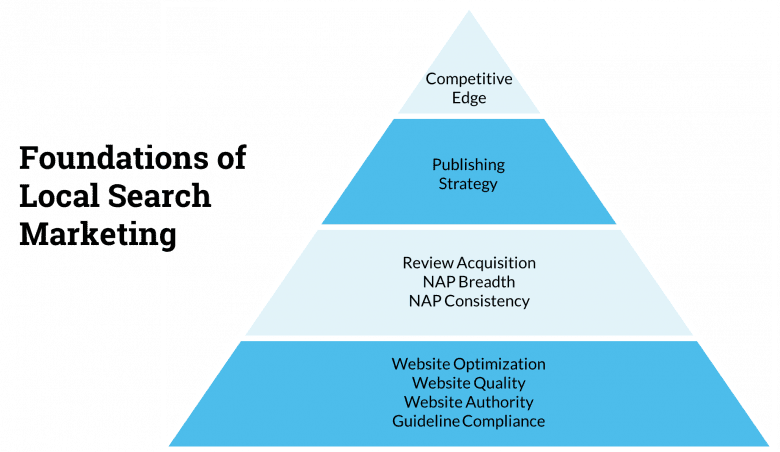Local Search Marketing
What is Local Search Marketing?
Local search marketing is anything you do on the web to promote a physical business that makes face-to-face contact with its customers. It applies to both single-location small and medium businesses (SMBs), national enterprise brands, and chains. If a company meets with its customers directly — either through a storefront or service area — it’s termed a “local business” and a unique set of techniques and skills can be used to increase its visibility on the Internet. This may also be referred to as “local SEO,” or local search engine optimization.
Far from being a one-and-done form of marketing, good local SEO builds upon a base of clear business information, using an array of marketing practices to transform an unknown brand into a local household word.
The following graphic gives an overview of the core tasks that make up a local SEO campaign, from bottom (fundamental) to top (advanced).
Understanding local search marketing
Local SEO means building on a strong foundation to ultimately gain the competitive edge. Those foundational elements are shown in the pyramid above.
Guideline compliance
The way you conceptualize and market your type of local business will be based on the Guidelines for Representing Your Business On Google. Your Google My Business listing is the most important listing you build for your company; failure to comply with Google’s guidelines can result in ranking failures and even listing takedowns. To play it smart, you must be able to see your business the way Google does and follow the appropriate guidelines.
Site authority
Your website can accrue some authority simply by virtue of its age, but you can actively pursue authority by earning links and mentions of your business from quality, relevant sources. Beware of links from low-quality sources or schemes that attempt to inflate link count with no concern for relevance. Industry surveys indicate that the quality and authority of the links you earn have a major impact on your local search rankings.
Site quality
If your website loads quickly, has a sensible structure, renders properly on all devices, features high-quality content, is free of malware or other malicious elements, and is easy for people to use, you’re meeting basic quality goals. No amount of marketing can make up for poor UX (user experience) on your website.
Site optimization
The search engine optimization (SEO) of your website aims to increase your organic (non-paid) search engine visibility via both technical and creative means. Local business websites don’t just focus on keywords about products, services, and topics; they also highly feature terms relevant to the cities in which the business serves.
NAP consistency
“NAP” is the common acronym for “name, address, phone number.” These three pieces of data make up the core of your business information in the world of local search. You’ll also sometimes see this written as NAP+W, with the “W” standing for your website URL. In order for consumers and search engines to trust the data they find across the web about your business, you must make every effort to ensure that its NAP+W is consistent on your website and on all third-party platforms where your business is listed or mentioned.
NAP inconsistencies can misdirect customers, costing you revenue. Further, when search engines like Google encounter NAP+W variants, they can become less trusting of the data they have about the company, which can result in lower local search rankings. To avoid NAP inconsistency, you’ll want to audit all places your business is listed or mentioned and correct any variants in the data.
NAP breadth
A core task of local SEO involves helping your NAP spread across the Internet. Much of this work hinges on building structured citations (local business listings) on important platforms like Google My Business, Facebook, Bing, Yelp, Superpages, etc. You can also build important citations on popular niche directories that relate specifically to your geography or industry. The breadth of your NAP can grow as your business earns unstructured citations/mentions on social platforms, blogs, news sites, and other resources. The number of both structured and unstructured citations you earn is believed to have a positive impact on local search rankings, as search engines find your business widely referenced around the web. You can do all of this work manually, or use convenient tools that automate structured citation building and active location data management for you.
Review acquisition
Reviews may be the most influential Internet factor for any local business. It’s estimated that 92% of consumers read online reviews and 68% state that positive reviews influence their feelings of trust in a business. Every local business needs a strategy for encouraging customers to leave reviews on a variety of platforms. Your job is to know the guidelines of each platform so that you don’t break rules, and to devote significant resources to this vital area of marketing. The number of reviews you earn can directly impact local search rankings, while the positive and negative sentiments in those reviews can directly impact conversions and earnings. Throughout the life of your business, you’ll be seeking to earn a wide array of positive reviews.
Publishing strategy
The moment any local business steps onto the web, it becomes a publisher. Your communications with consumers may include the basic text content of your website, a blog, video or image content, owner responses to reviews, and social media participation. Everything you publish should engage customers and expose them to your brand. Search engines not only measure content quality, but also the way in which users interact with content, meaning the content you produce should result in high levels of user engagement. Plus, your high-quality content may be shared by your industry and consumer base, further promoting your business. You must devote time and creativity into developing and executing a publishing strategy, for as long as your company is in business.
Competitive edge
The three bottom tiers of our pyramid are fundamental tasks in a typical local SEO campaign. In a competitive industry/geography, your competitors are experts when it comes to these core areas. You must look beyond the basics if you want to stand out from the pack.
Gaining a competitive edge in a crowded market requires a unique effort for each business, based on discovering opportunities your rivals haven’t yet explored.
Say a grocery chain notices that its competitors are not publishing videos on YouTube of a star chef preparing popular/trendy food items. If the grocery chain were to create these videos, they could set the business apart. Competitive difference-makers will be unique to each company and represent the advanced tactics businesses need to undertake when the fundamentals fail to give them an edge. This is where marketing ingenuity comes into full play.
How long does it take to learn local SEO?
As you’ve now learned, local search marketing strives to engage consumers in a specific geographic area. Nearly all local SEO techniques require ongoing effort, as each business invests in the continual growth of brand visibility and recognition within a targeted community.
Call Us Lucky DC Advertising your award winning local search experts at half the price. (949) 613-3013
Information reference from MOZ Local Search Marketing 2020

